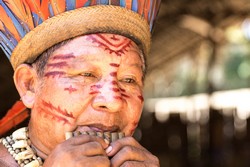The experiences of indigenous peoples during the colonisation of Brazil
In the 18th century in particular, there were many kinds of clashes between indigenous peoples from different ethnic origins and territories in Brazil and both Portuguese and non-Portuguese conquerors. The cultural differences as well as shifting alliances between various cultures led to widespread political tension, ethnic violence and social disruption. The project NATIVE INQUISITION (The native peoples and the Portuguese inquisition) analysed the social relationships and other cultural and religious practices that were established through contacts among the Christian coloniser, Africans and the native peoples of Portuguese America. The project's main objective was to better understand how the natives of Portuguese America resisted and adapted to their inclusion in colonial Brazil's society – one marked by cultural hybridism and interbreeding of people with different racial types. Employing an ethnohistorical approach and looking at social-cultural and religious practices, researchers sought to interpret these populations' cultural dilemmas in religious and interethnic contacts with the coloniser. Initial work focused on the diversity of the relationships between the native peoples and other types of cultural agents (e.g. religious orders, traders, settlers, explorers), Africans slaves and African-Brazilian descendants. The goal was to shed light on the adaptability and resistance experienced by indigenous peoples in relation to these other actors. Researchers then studied the role played by the indigenous peoples and their descendants in this scenario. NATIVE INQUISITION considered the daily contact between these groups to understand the various levels of cultural connections. The work also looked at the paradigmatic opposition between indigenous and mixed people ('mestizos') of modern Europe. NATIVE INQUISITION provided a description and researched inquisitorial accusations against the indigenous and mestizos, and mapped the ethnic groups and their regions from the 16th to 19th centuries. An inventory of related historical sources has been produced to facilitate future research on the native peoples involved with the Portuguese Inquisition. The team also created a database listing all those prosecuted by the Inquisition as well as a detailed inventory of all the inquisitorial accusations and processes against indigenous peoples. This project's research and dissemination of findings through teaching courses contributes to knowledge of indigenous cultures and can also help enhance understanding of modern-day Latin America.



